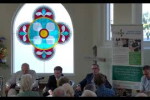During the Culture Secretary of State's statement announcing that the BBC Licence Fee will be frozen at £159 for the next two years, James called on the BBC to be more ambitious in generating commercial returns to reduce the burden on licence fee payers.
The TV licence fee has been frozen until 2024 before rising in line with inflation for four years as the government moves to support families in the face of rising living costs.
The plans for the new licence fee settlement cover a period of six years and will take effect from 1 April 2022 until 31 March 2028.
The settlement will give the corporation the financial certainty it needs and a clear funding stream to deliver effectively on the Mission and Public Purposes set out in its Royal Charter while protecting households at a time when many are facing financial pressures.
It means the BBC is expected to receive around £3.7 billion in licence fee funding in 2022 and £23 billion over the duration of the settlement period. The BBC also receives more than £90 million per year from the government to support the BBC World Service.
BBC Royal Charter
The BBC’s Royal Charter sets out that the current licence fee model should remain in place until the Charter concludes on 31 December 2027 and the Culture Secretary is required to set out funding for the corporation for the remainder of the period.
The Charter requires the Culture Secretary to assess the BBC’s commercial income and activities and the level of funding required for effective fulfilment of its Mission and Public Purposes.
Following a period of negotiation she has concluded the settlement must shield licence fee payers from the current inflationary pressures for the next two years while providing billions of pounds and secure funding for the BBC for the next six years.
She believes the settlement strikes the right balance between protecting households and allowing broadcasters to deliver their vital public responsibilities while also encouraging them to make further savings and efficiencies.
Using current economic estimates it is expected that under this settlement the cost of the licence fee will increase by only around £3.50 in 2024 to £162.50. While inflation can change, by the final year of the settlement it is anticipated the licence fee will cost less than £175.
Further government support
The government has committed to support the BBC in what is a fast-changing broadcasting landscape by more than double the borrowing limit of the BBC’s commercial arm to £750 million.
This will enable the BBC to fund a commercial growth strategy which can benefit the creative economy across the UK. The UK’s creative industries are a vital part of the economy and in 2019 contributed £115.9 billion to the country.
Next steps
The licence fee settlement is only one step in the government’s roadmap for reform of the BBC.
Later this year, as part of the Mid-Term Review of the BBC’s Charter, the government will start to consider the overall governance and regulation of the BBC, whether the current arrangements are working effectively and whether reforms are necessary.
Following the BBC’s 10-point action plan on impartiality and editorial standards in response to the Serota Review, the Mid-Term Review will also look at whether the plan has contributed to improving the internal governance of the organisation.
Looking further into the future and, in light of the huge changes in the broadcasting landscape over the past decade with the arrival of streaming and video on demand, the government will also separately consider whether the licence fee will remain a viable funding model for the BBC. No decision on the future of the licence fee has been made.

